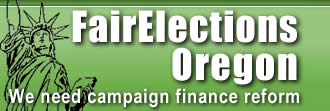Measures 46, 47 will fight political impropriety
Measures are complicated, but they are worth the risk
October 29, 2006
Here's a suggestion if you still are deciding which way to vote on measures 46 and 47. Make two lists. On List A, write down the numerous reasons to oppose the campaign-finance measures.
For starters:
- Measure 46 would trim part of the free-speech protections in the Oregon Constitution. It would do so by legalizing limits on election-related contributions and expenditures for candidates seeking state or local offices.
- The proposals would undercut majority rule. A supermajority of the Legislature -- three-fourths of each house -- would be needed to adopt new campaign-finance rules or modify ones passed by voters.
- Measure 47 ranks among the most complicated initiatives to reach Oregon's ballot. The limits are so complex that the typical candidate, let alone the average donor, has no hope of understanding them.
- The measures would undermine the ability of unions, corporations and nonprofit groups to influence elections.
- Courts might overturn some provisions, especially the limits on independent expenditures and on candidates' donations to their own campaigns.
- Expensive campaigns benefit the Oregon economy, with millions of dollars going for advertising, printing and polling.
- An unlikely roster of groups has united to oppose the measures: unions, authors, Realtors, Stand for Children, NARAL Pro-Choice Oregon, Oregon Right to Life and others.
Here's List B, reasons to support the measures:
- The corrupting influence of money in politics.
Now compare the two lists. You'll find that List B, short as it is, outweighs everything on List A.
Big campaign contributions have such an insidious effect on politicians that measures 46 and 47 are a worthwhile gamble for Oregon voters.
The measures -- especially No. 47 -- are complicated because they are aimed at closing all the loopholes. As a result, candidates and organizations would have to pay much closer attention to campaign-finance law.
Some people legitimately worry about amending Oregon's free-speech provisions through Measure 46. However, it's not surprising that so many other groups and individuals are opposed: They'd lose their clout.
They want campaign-finance "reform" that restricts the other guy, not them.
If these opponents have a better solution -- one that is fair, specific and restrictive to everyone -- they should say so. The Legislature has shown little inclination to adopt stringent limits, so it's up to the people to take action.
Oregon has become the Wild West of political finance. Want to buy an election? Come to Oregon. Want to spend as much as you want? Run for office here.
Gubernatorial candidates Ron Saxton and incumbent Ted Kulongoski together have raised a record $9.3 million -- just for the general election. It's no wonder that Kulongoski says candidates spend 75 percent of their time raising money.
The Salem-area race between Rep. Billy Dalto and Brian Clem in House District 21 has topped $600,000. In House District 49, the race between House Speaker Karen Minnis and Rob Brading will exceed $1 million.
How can any political office be worth that much? Having made such hefty investments, contributors surely will expect something in return.
Talking recently with the Statesman Journal Editorial Board, one legislator said with a straight face that contributions don't influence him; they only guarantee access to him.
But with access comes power. Measures 46 and 47 would return power where it belongs.
To the people of Oregon. |



